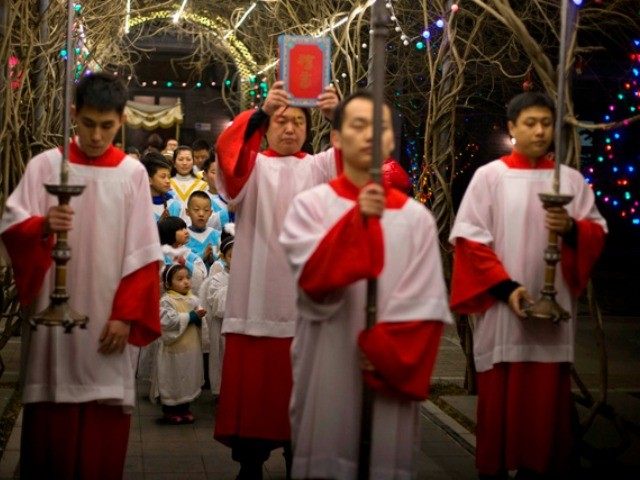Communist officials have arrested and jailed Gu Yuese, the pastor of the 10,000-member Chongyi Church, which is China’s first Christian megachurch.
Police have reportedly sent Gu to a “black jail,” a detention facility outside of the country’s established penal system.
As a member of China’s state-approved Protestant denomination, the Three-Self Patriotic Movement (TSPM), Gu was a pastor in good standing with the Communist Party until he began publicly protesting the government-sponsored campaign to remove and demolish crosses in the Zhejiang province in 2014.
Though the pastor is ostensibly being held under charges of embezzlement of funds, Gu’s detention is actually “political revenge” for Mr Gu’s “disloyalty to the Chinese Communist Party’s religious policy” according to Bob Fu, president of the US-based Christian human rights group China Aid.
“In the past two weeks 18 crosses were removed and destroyed,” Fu said, adding that in total “at least 1,800 crosses of churches were demolished since the campaign started.”
Zhejiang, a province located in the south east of China, is home to many churches, particularly in the city of Wenzhou and Gu’s Chongyi Church is in the province’s capital city of Hangzhou.
Fu called the arrest an “escalation” in China’s crackdown on Christians, which has mostly targeted house churches, saying that it sends a signal “to silence any potential future dissenting voices from within the church. It tells everyone to shut up.”
Gu and his wife, Zhou Lian Mei, who has also been taken prisoner and is being held in a separate facility, prepared a statement for members of their congregation, asking for prayers and urging members to stay strong in the face of trials.
Chongyi Church is experiencing “unprecedented, chilling trials,” they wrote. “Everyone must equally rely on the Lord’s grace to confront [this hardship] and triumph over it.”
The couple also wrote that the ordeal “will refine every impurity in our ministry team to the greatest extent and compel us to love the Lord and people more purely. People in Chongyi Church will worship the only true God!”
David Ro, international deputy director for East Asia of the Lausanne Movement, has suggested that the Communist Party’s clampdown on Christian churches may reflect a campaign to “indigenize” Christianity, removing traces of its ties with the West.
“Three-Self churches with huge buildings and highly visible red crosses appear to resemble Western cathedrals, in contrast to the less visible ‘indigenous’ house church Christianity which some officials may feel is more appropriate for China,” Ro wrote.
Ro also cited internal politics as well as an “emerging leftist movement with nostalgia for Mao” among possible factors behind the persecution.
China’s crusade against the Christian cross has continued unabated since 2014 and reflects a particular animus toward the central symbol of the Christian faith.
“The authorities have attached great importance to this religious symbol,” said Zheng Leguo, a pastor from the Zhejiang province who now lives in the United States. “This means no more prominent manifestation of Christianity in the public sphere.”
Last October, the Chinese Communist party announced its intentions to intensify restrictions on Christian churches, following on a series of government measures meant to intimidate Chinese Christians, such as arbitrary detention of Christian clergy and the closing of churches..
According to a Reuters report, under President Xi Jinping, China is conducting the worst domestic crackdown on human rights in two decades and much of this is against Christians. Nearly 1,000 rights activists were detained last year alone—almost as many as in the previous two years combined.
In late August, police arrested China’s most prominent Christian lawyer, Zhang Kai, who defended and gave legal counsel to a number of Christian churches throughout the country, especially against the government’s cross-removal campaign.
Zhang and his intern Liu Peng were arrested the night before he was to meet with US ambassador-at-large for international religious freedom, David Saperstein.
China’s increasing hostility toward Christianity may also reflect an awareness and growing frustration with the religion’s continued growth in the officially atheist nation.
Though the Chinese Communist Party is the largest explicitly atheist organization in the world, with 85 million official members, it is now overshadowed by an estimated 100 million Christians in China.
Christianity is growing so fast in China that some predict that it will be the most Christian nation in the world in only another 15 years. By far, the greatest growth is coming outside the official state-sanctioned churches, which are considered subservient to the Communist Party. Numbers are increasing mostly in unofficial Protestant “house churches” and in the underground Catholic church.
Follow Thomas D. Williams on Twitter @tdwilliamsrome

COMMENTS
Please let us know if you're having issues with commenting.